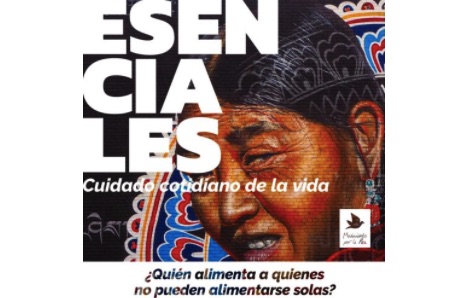… EDUCATION FOR PEACE …
An article from El Faradio (Copied and disseminated according to the Creative Commons License of El Faradio)

One of the images from the campaign “Essentials”
Given the situation of confinement including education, the Movimiento por la Paz (MPDL), a member of the Cantabrian Coordination of NGDOs, emphasizes more than ever the need for an education in values based on respect and mutual support in which no one is left behind.
“From leisure and free time, favorable spaces are generated where the culture of peace can be fostered, with a focus on gender and Human Rights,” they highlight, which is why they have organized an online course for people who work in this area.
The course “Five paths for peace: a strategy of education in values for free time” will begin on May 18 and will be conducted through a virtual platform that an be freely accessed.
There are twenty places for participants that will be filled in order of registration.
To be able to register, it will be necessary to do it at the link https://forms.gle/Tygx46gZZ5HTLyr28 or via email r.cifrian@mpdl.org .
(Continued in right column)
(Click here for the original Spanish version of this article.)
Where is peace education taking place?
How can we work together to overcome this medical and economic crisis?
(Continued from left column)
The course will address the keys and educational resources to promote values education in leisure and free time, including cultural diversity, gender equality, the fight against poverty, care for the environment, and human rights.
‘ESSENTIALS’
On May 1, on the occasion of the International Day of Workers, the Movimiento por la Paz wants to especially recognize women workers in the domestic and care fields and their activity as essential for the care of life. That is why they demand the construction of a new model in which care becomes an essential element of our production and coexistence system.
Under this message they have launched the ESSENTIAL campaign, to make care visible as an essential element for the protection of life and to raise the voice against the labor exploitation of women workers in the domestic and care fields.
Women domestic and care workers face triple discrimination: they are women, mostly migrants, and exploited. They are especially vulnerable because of the violation of their labor rights, which is explicitly reflected in current legislation.
The Domestic Service appears as a Special Regime within the General Social Security Regime, which is characterized by deficiencies related to remuneration, contribution and working conditions. “In this sense, we are facing the only group of workers who do not have the right to unemployment benefits in our country,” laments the organization.
To get an idea, in Spain according to the latest Labor Force Survey (EPA), the domestic employment sector employs 637,700 people. Almost all of the positions are occupied by women (96%) and only 420,288 are registered with Social Security.
To this we must add that 42% of the workers have foreign nationality and as it is mainly in the private sphere, it is a job that largely deals with women in an irregular situation.